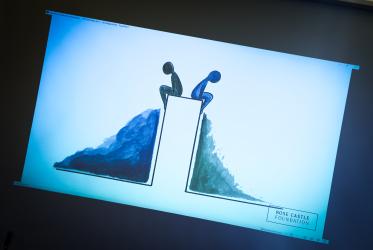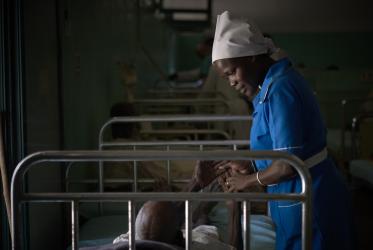“We are part of a struggle in defense of water, life, and mother earth,” people from the Peaceful Resistance Movement of La Puya told us. La Puya is a campsite at the entrance of the El Tambor gold mine in Guatemala, built by some local people five years ago after Kappes, Cassiday and Associates (KCA) – a U.S. based company, tried to bring in equipment to start mining.
They had notified government officials that the license for operation of the mine had been granted by the Ministry of Energy and Mining (MEM) without community consultation, and that the Environmental Impact Assessment was inadequate. But the government had not taken any action.
This was the first community visit for the Presbyterian Church USA Travel Study Seminar on “Peacemaking, Climate Justice and Faith in Guatemala and Costa Rica” in August. We also visited several communities that joined together to resist the El Escobal silver mine, operated by Minera San Rafael.
These visits brought to life the human and environmental impact of chemical mining, as well as the persistence, courage, and deep faith of communities engaged in peaceful resistance in the face of repression, criminalization and violence.
As we entered La Puya, we saw a sign saying “Water is more valuable than gold,” colorful murals on walls, and a platform with an altar and posters of Archbishop Romero from El Salvador (d.1980) and Bishop Juan José Gerardi Conedera of Guatemala (d.1998) – both murdered for their defense of the rights of the people – and a local leader, who had died in an accident that some think might have been a murder. The women, men, and children at La Puya welcomed us when we arrived and shared their stories with us.
Despite opposition and harassment, they had successfully blockaded the mine for two years, until May 23, 2014. On that day about 500 national police came with tear gas, rubber bullets, and smoke grenades to evict them. Several people were sickened by the gas, others were dragged and beaten. The blockade was broken after more than two years, and mining began.
Many trees were cut down, and the butterflies disappeared. Their groundwater water has been contaminated by the chemicals used to mine, causing skin problems. Their water supplies have also been dramatically diminished. They know that drought in the area brought by climate change has contributed to this. But the mining process uses in an hour what a family would use in 20 years!
Women were leaders in the resistance from the beginning. Two women told us that they endured harassment from supporters of the mines to humiliate them, such as calling them “whores.” Members of the resistance had agreed that women would be on the front lines when the national police came. They told us how they would kneel or stand, praying and singing religious songs or the national anthem. Then the men were crudely taunted by the police, accused of hiding behind the skirts of women – and worse.
After the opening of the mine, they allied with local and international non-governmental organizations in an advocacy campaign and legal battle to stop it. CALAS (The Center for Legal-Environmental and Social Action in Guatemala) filed a legal case for La Puya. (Our host in Guatemala, CEDEPCA - The Protestant Center for Pastoral Studies in Central America, is a partner of CALAS.)
The legal battle showed that the community was in the right, but also that the mining company wouldn't give up easily.
In February 2016, a preliminary injunction from the Supreme Court voided the mining license, based on lack of consultation as required by the International Labor Organization’s Indigenous and Tribal People’s Convention 169.
Its protections include the local community’s right to prior, free and informed consultation for any development project in their territory. The Guatemalan government is a signatory to this Convention. On May 5, 2016, the Supreme Court made the preliminary injunction permanent and suspended KCA’s mining license.
The mine had already ceased operations. But last spring when the road was closed, KCA flew workers in helicopters to the mining area. When La Puya complained, they were told that KCA needs to maintain the mine from contaminating the water. Since the original mining license was for twenty years, the peaceful resistance movement continues their presence at the campsite.
We travelled on to Costa Rica, where we were hosted by the Latin America Biblical University. We visited Milano, a community whose water had been contaminated by a pineapple plantation. Their water is so contaminated that if boiled, oily rings and substances are what remains. They used legal processes to demand clean water. Rather than requiring the company to clean the water, the government has water delivered in big containers a few times a week, but the deliveries are not always enough nor on time. They asked us to tell their story so that people know the human and environmental impact of industrial agriculture.
Gustavo Cabrera, from Servicio Paz y Justicia, spoke to us about global and regional struggles for justice. These are conflicts between those whose who have power and control in the political economy – whose projects bring death, and those who stand for what gives life – human rights, inclusion, and the integrity of creation.
He sees hope in social movements confronting this system. Churches must learn to read these processes, and ask what to say and do in light of God’s commitment to life.
The communities we visited, both in Guatemala and in Costa Rica, thanked us for coming, saying that it had strengthened their resolve. We committed to sharing their stories in our communities, and with our governmental officials. We also committed to following up on denominational pension funds: if we have investments in mining companies, we should use our influence to act for change – or divest. These are acts of solidarity which support peaceful resistance and promote justice.







